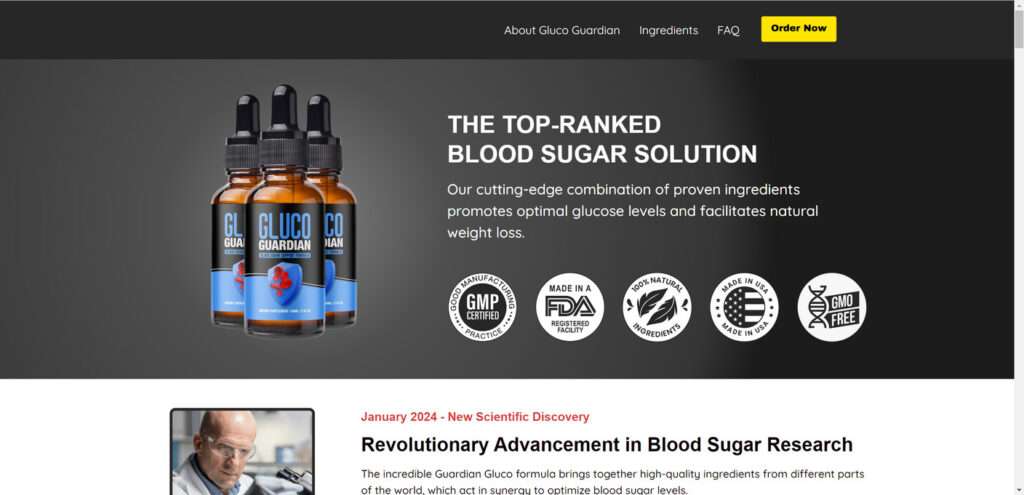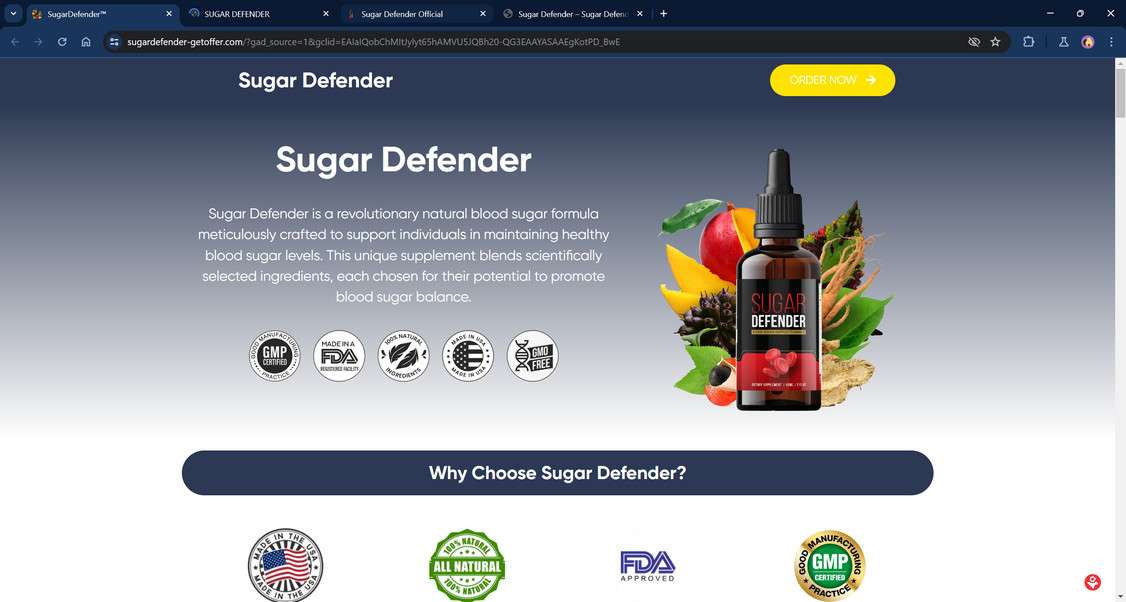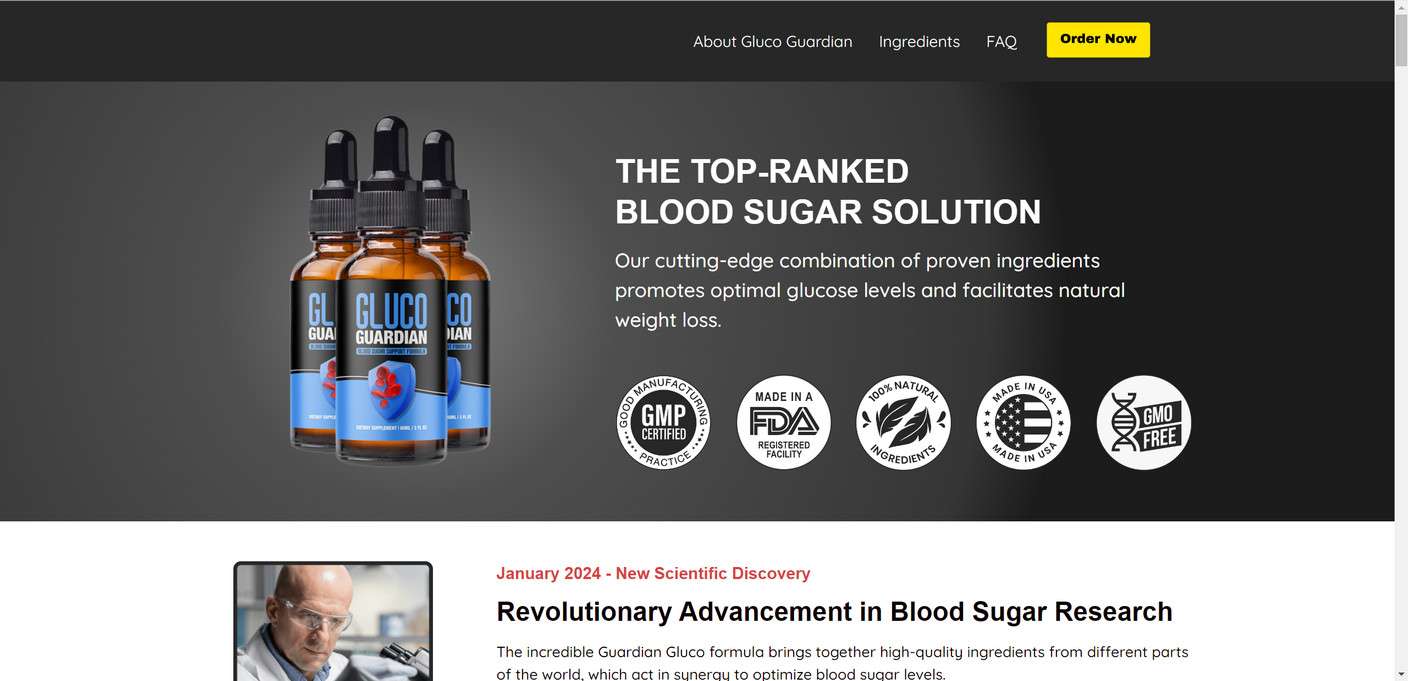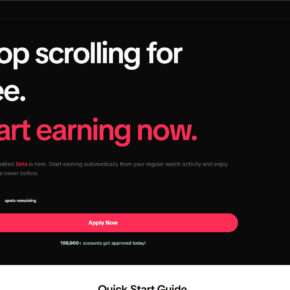Scammers are aggressively promoting a suspicious product called Gluco Guardian that uses exaggerated claims and even deep fake celebrity endorsements to take advantage of people struggling with blood sugar problems like diabetes. This comprehensive article will reveal how the scam works, provide tips for avoiding it, and explain why Gluco Guardian is almost certainly an ineffective supplement not worth your money.


Overview
The questionable Gluco Guardian product is being aggressively promoted through an elaborate scam designed to mislead and exploit consumers, especially those struggling with diabetes or prediabetes.
Numerous shady websites are utilizing fake celebrity endorsements, exaggerated claims, fraudulent reviews and high-pressure sales tactics to sell Gluco Guardian as a miraculous natural blood sugar regulator and diabetes cure-all. However, all signs point to it being yet another overpriced, ineffective supplement that will likely provide little to no benefit.
The scammers are ruthlessly targeting susceptible individuals looking for solutions for elevated blood sugar and related health problems. Diabetes impacts over 37 million Americans who are desperate for treatments allowing them to regain control of their health. These consumers want to believe a natural supplement like Gluco Guardian can provide the convenience and relief prescription medications may not offer.
The deceptive marketing preys on this desperation. The websites feature supposed ringing endorsements from celebrities like Martha Stewart and Whoopi Goldberg claiming Gluco Guardian allowed them to reverse diabetes symptoms almost overnight. It makes bold claims such as balancing blood sugar, boosting weight loss, increasing energy, improving heart health and more.
However, absolutely no proof is provided to substantiate any of these benefits. The celebrity testimonials are fake – in reality, none of them have endorsed or likely even heard of Gluco Guardian. All evidence suggests this is a scam meant to squeeze money out of folks struggling with real medical issues.
The shameless marketing even tries to add legitimacy by claiming the product is “doctor-formulated” and manufactured in an FDA-registered facility. But this does not mean it is FDA-approved or scientifically proven like real medications. Gluco Guardian and its ingredients have undergone no rigorous clinical trials or independent testing whatsoever.
In fact, the few ingredients listed like African mango, maca root and guarana are not shown to have any significant impacts on blood sugar or insulin levels. Any benefits are likely minimal without lifestyle changes. And “natural” certifications mean little regarding safety or efficacy.

Yet the scammers want diabetic consumers to believe just taking a few drops of this mystery liquid daily will balance blood sugar and cure their illness. The websites warn supplies are selling out fast, so you better buy now before prices rise. Of course, more bottles purchased means more money in the scammers’ pockets.
And many customers ultimately find themselves unwillingly signed up for monthly shipments of Gluco Guardian without consent. When they try to cancel or get refunds, the company rejects them on technicalities. They make it extremely difficult and often impossible to get your money back once they already have your credit card details.
A similar product called Sugar Defender has been investigated by Jordan Liles on his YouTube channel, where he offers a detailed video on the subject. We recommend watching his video for a comprehensive understanding the shady marketing behind these similar products.
In summary, Gluco Guardian shows multiple red flags of an unscrupulous scam: exaggerated health claims, fake celebrity endorsements, questionable ingredients, aggressive sales tactics involving recurring undisclosed charges, and barriers to returns and refunds. Diabetes patients and others struggling with blood sugar issues should not waste their money on this product and instead look for treatment options proven safe and effective.
How the Gluco Guardian Scam Sites Work
Understanding the step-by-step process behind the Gluco Guardian scam can help you recognize and avoid it. Here is how they strategically manipulate and mislead consumers:
1. Fake Celebrity Endorsements Build Hype
The scam begins with internet ads on Google, Facebook, YouTube and elsewhere featuring deep fake AI voices and likenesses of celebrities like Martha Stewart, Dolly Parton and Whoopi Goldberg. The fake celebs make exaggerated claims about Gluco Guardian such as it letting you “eat all your favorite foods guilt free” or “dropping pounds almost instantly.”
This technique builds hype and gets people’s attention by making it seem like it’s a revolutionary new product endorsed by trusted stars. However, the real Martha, Dolly, Whoopi etc. have no association with Gluco Guardian whatsoever.
2. Misleading Websites Full of False Claims
Clicking these ads leads to slick-looking websites mentioning the fake celebrity endorsements again and making even bolder claims about Gluco Guardian. For example:
- “Balance your blood sugar fast without medication”
- “Melt away fat by reducing blood sugar levels”
- “Clinically proven to reverse diabetes symptoms in 4 weeks”
Other questionable claims include that it’s doctor formulated, FDA approved, made in the USA and so on. However, none of these claims are verifiable.
3. Aggressive Sales Tactics Pressure You
The websites utilize aggressive sales tactics to get your credit card information as fast as possible before you have time to research the product or claims.
Tactics include:
- Countdown timer saying the low price will expire soon
- Limited supply warnings
- Fake customer reviews and testimonials
- Claims the price will go up after today
They want to create urgency so you buy right away rather than look into it more.
4. Monthly Subscriptions Signed Up Without Consent
Many people who bought Gluco Guardian soon discovered recurring monthly charges from the company without their authorization. The sites enroll you in subscriptions simply for entering your credit card details to “pay shipping.”
They make subscriptions the default choice during checkout but hide the terms in small print so people don’t notice. Many consumers say they can’t stop the monthly charges despite calling to cancel.
5. Refunds and Returns Made Extremely Difficult
Anyone who tries getting a refund for Gluco Guardian quickly realizes the company makes it nearly impossible. Reasons they decline refunds include:
- You didn’t request one within the short trial period
- You used too much of the product already
- It’s past the return date they specify
Essentially, they put major roadblocks in the way of returns to keep your money. Many complaints allege customers only received partial refunds after long fights. Others got none at all.
Gluco Guardian on Amazon and Walmart
In our research, we also found Gluco Guardian being sold on major retailers like Amazon and Walmart under various third-party sellers. However, it’s unclear if these are the exact same formulation being deceptively marketed through the fake celebrity ads and shady websites.
The Amazon listings have very poor ratings, with multiple 1- and 2-star reviews complaining about receiving defective, leaking bottles with questionable contents. Others report trying to return unopened bottles but being refused due to no refund policy.
One reviewer on Amazon shares a disturbing image of what looks like mold floating in their Sugar Drops bottle, writing “I would like to know if this is normal.” Several others simply advise “Don’t waste your money.”
While Gluco Guardian supplements sold on Amazon and Walmart may share the same name as the version promoted on the scam sites, the low ratings indicate inconsistent quality control issues. And the shady companies behind the fake ads likely have no association with these retail listings.
We cannot confidently say these Amazon and Walmart products are the real Gluco Guardian or recommend purchasing them. Consumers are better off avoiding any supplement with this name given the overwhelming evidence of predatory marketing practices. Talk to your doctor first about any natural blood sugar remedies.
Should you buy Gluco Guardian?
At best, Gluco Guardian appears to be an overpriced supplement making unsupported claims about regulating blood sugar and reversing diabetes symptoms. At worst, it could be an outright scam product not worth the risks.
We strongly advise all consumers to talk to a qualified medical professional before trying Gluco Guardian or any supplement marketed for blood sugar control, diabetes or weight loss. Do not discontinue prescription medications or ignore medical advice to try such products.
A doctor can help determine if natural supplements may be appropriate as an addition to, not replacement for, traditional treatments they recommend based on your health history. Beware any product claiming to cure or permanently eliminate chronic conditions like diabetes overnight.
Work with your physician to develop a holistic plan for managing blood sugar utilizing proven options like lifestyle changes, FDA-approved medications, glucose monitoring, and medical supervision. Relying on unproven supplements with questionable ingredients is not worth jeopardizing your health.
The safest path is using trusted medical guidance, not miracle supplement claims. Talk to a doctor first before trying Gluco Guardian or similar products pitched online using dubious marketing tactics. Your health is too important to risk on sketchy supplements.
What to Do if You Fell For the Gluco Guardian Scam Websites
If you already bought Gluco Guardian and lost money to this predatory scam, take the following steps right away to mitigate the damage:
Request a Refund Immediately
Contact the company that sold you Gluco Guardian (there are many who sell it) quickly to request a full purchase price refund. Do this even if you think the return period has expired – some consumers have luck getting refunds past the cutoff. Explain that you feel the product was misrepresented.
If they deny the refund or only offer partial, firmly tell them you will pursue other options to get your money back if needed. Also request they cancel any recurring monthly subscriptions.
Dispute the Charges With Your Bank
If Gluco Guardian refuses a refund, call your credit card company or bank to report fraudulent charges. Explain that you were misled by the ads and claims on the site and did not agree to ongoing monthly charges. The bank may be able to reverse the transactions and stop future billings.
Report the Scam Online
Leave negative reviews about your experience on websites like Trustpilot to warn others. You can also file official complaints with:
- Better Business Bureau (BBB)
- Federal Trade Commission (FTC)
- State consumer protection agency
The more complaints against Gluco Guardian, the more likely authorities will take action against the company for illegal practices.
Seek Legal Options
Talk to an attorney specializing in consumer protection law about possible options for recouping your money. A lawyer can assess if you have grounds for legal action over the deceptive marketing, unauthorized credit card charges or other issues.
If enough victims come forward, a class action lawsuit may be possible to hold the company accountable. But act quickly, as statutes of limitations apply.
Frequently Asked Questions About the Gluco Guardian Scam
1. What is Gluco Guardian?
Gluco Guardian is a dietary supplement being deceptively marketed online as a miracle cure for balancing blood sugar and reversing diabetes. Scam websites promote it using fake celebrity endorsements, false claims, and high-pressure sales tactics. However, there is no clinical evidence that Gluco Guardian can deliver the benefits advertised.
2. How does the Gluco Guardian scam work?
The scammers run ads online featuring deepfake videos of celebrities like Martha Stewart raving about Gluco Guardian. The ads lead to websites making unrealistic claims about the supplement to convince people to buy it. They utilize aggressive sales tactics to get credit card information quickly before people can research the product. Many customers find recurring monthly charges they never agreed to. Refunds are made very difficult or impossible to obtain.
3. What ingredients are in Gluco Guardian?
The marketed ingredients include eleuthero, coleus, maca root, African mango, guarana, gymnema, ginseng, and chromium. However, there is no proof these ingredients have significant impacts on blood sugar or diabetes symptoms when taken in supplement form. The amounts and quality of ingredients are unknown.
4. Is Gluco Guardian FDA approved?
No, Gluco Guardian is not approved by the FDA. The websites falsely claim it is “made in an FDA-registered facility” to seem legitimate. But dietary supplements do not need FDA approval before being sold. Gluco Guardian has not undergone any clinical trials to prove safety or efficacy.
5. Are the celebrity endorsements real?
No. The videos of celebrities like Martha Stewart, Whoopi Goldberg, and Dolly Parton endorsing Gluco Guardian use fake AI-generated footage. None of these celebrities have actually promoted or supported Gluco Guardian. The false endorsements are meant to build credibility and hype.
6. Are the amazing testimonials from real customers?
Most likely not. The supposed customer reviews praising unbelievable results from Gluco Guardian are misrepresentations. They use stock photos or stolen photos instead of real user images. The dramatic stories of diabetic symptoms vanishing overnight are fabricated to make the product seem effective.
7. Can Gluco Guardian really cure diabetes?
No. There is no supplement proven to permanently cure diabetes or eliminate symptoms overnight. Gluco Guardian provides no evidence to support its bold claims of regulating blood sugar, increasing insulin production, or reversing diabetes. Diabetes patients should not trust such false marketing and instead rely on professional medical treatment.
8. Is buying Gluco Guardian worth the risk?
No. Gluco Guardian shows multiple signs of being a scam product backed by false marketing. It is likely ineffective, overpriced, and not worth the financial risk. Consumers should avoid wasting their money on this dubious supplement. Those struggling with elevated blood sugar or diabetes should consult a doctor.
9. What should I do if I already bought Gluco Guardian?
If you purchased Gluco Guardian, contact your credit card company and dispute the charges as fraudulent. Also request the seller cancel any recurring monthly subscriptions. Leave online reviews warning others about the shady marketing practices. Report the scam to the FTC and BBB to potentially stop the company from victimizing others.
10. How can I spot similar supplement scams?
Beware of supplements marketed online with fake celebrity ads, incredible claims of curing disease, aggressive sales tactics and barriers to returns. Legitimate products will be upfront about ingredients, testing, and possible side effects while making realistic claims. Consult doctors before taking any supplement marketed for blood sugar, diabetes or weight loss.
The Bottom Line on Gluco Guardian
At best, Gluco Guardian is an overpriced supplement unlikely to deliver the almost miraculous health benefits marketed. At worst, it could be an outright scam making false promises to exploit people desperate for help with diabetes or weight loss.
No credible scientific evidence proves Gluco Guardian can stabilize blood sugar, “melt away fat” or cure disease as claimed. The few listed ingredients like maca root and African mango are not clinically shown to have such powerful effects. Any positive impacts are likely negligible.
Additionally, a supplement made in an FDA-registered facility does not mean it is FDA approved or rigorously tested for safety and efficacy like an actual drug. The shady marketing tactics, fake reviews and monthly subscriptions are all red flags of a predatory scam.
Consumers should avoid Gluco Guardian and other products making similar unfounded claims. Talk to your doctor before trying any supplement marketed for blood sugar, diabetes, or weight loss – especially those promoted via deceptive ads or websites. A healthy, balanced diet and exercise regimen are still the best ways to manage these conditions for most people.
This article is for informational purposes only and should not be relied upon for financial or business decisions. We identify potential scams using research, user experiences, and expert analysis. However, all claims should be independently verified. Mistakes may occur, and legitimate products could be flagged. We strive for accuracy but make no warranties regarding the completeness or reliability of the information.
If you are the owner of the website or product in question and wish to offer clarifications regarding your business or website, please reach out to us via our Contact form.



